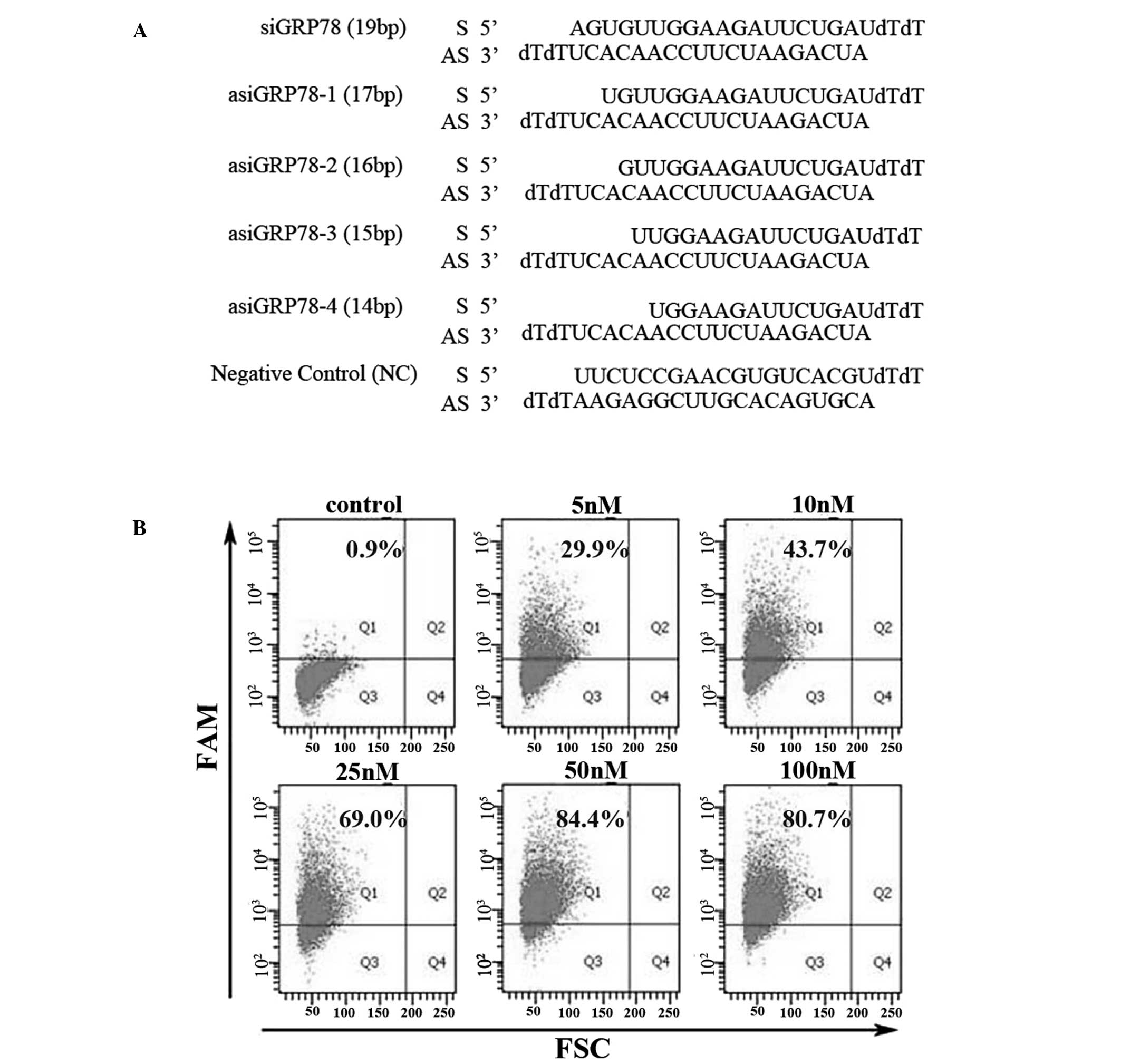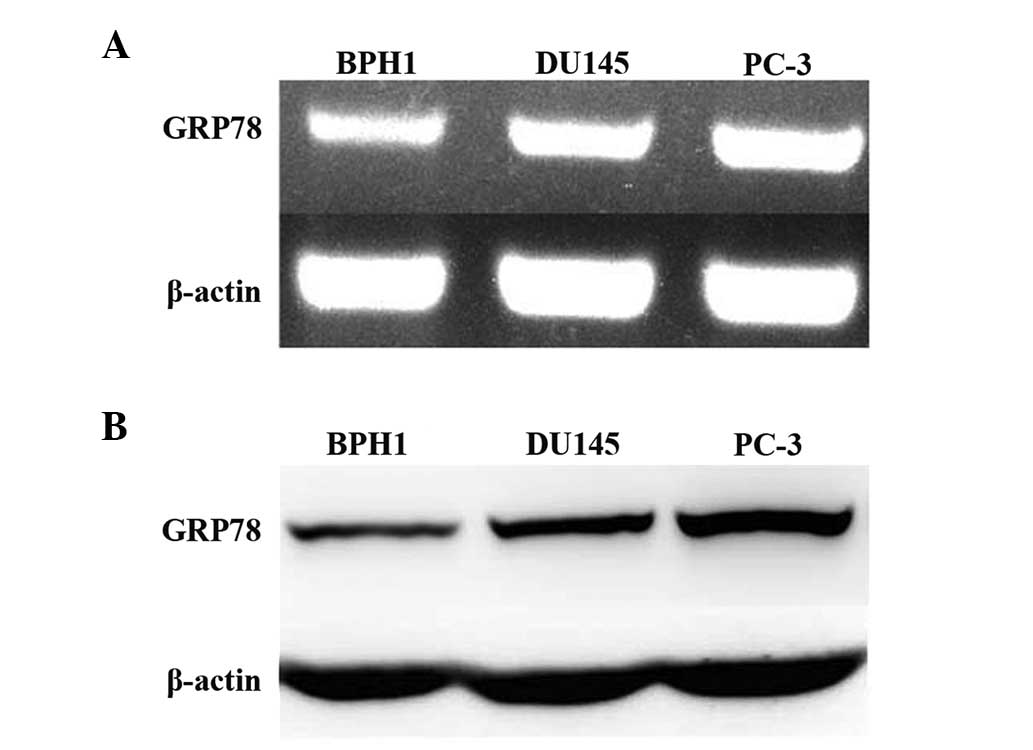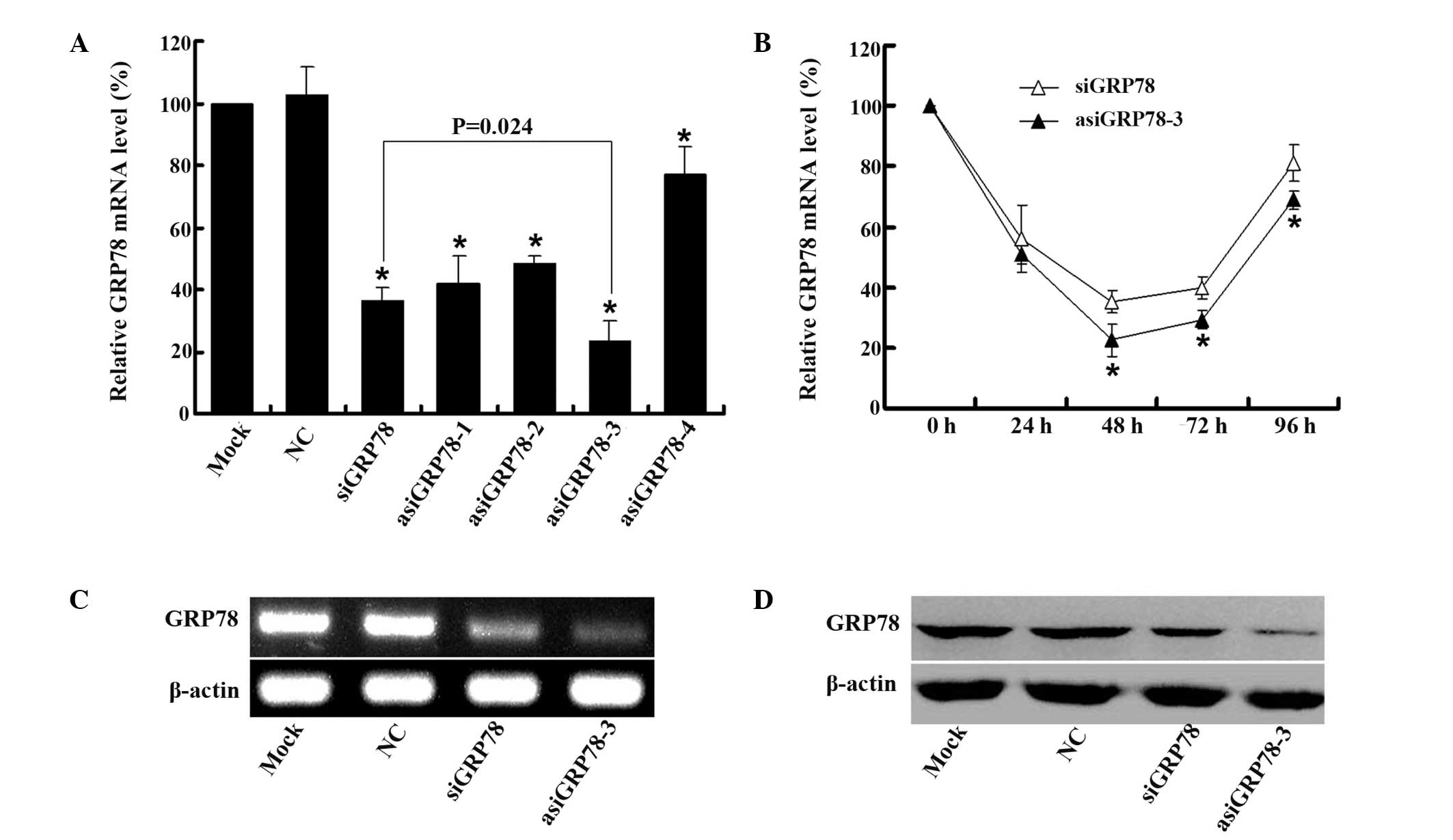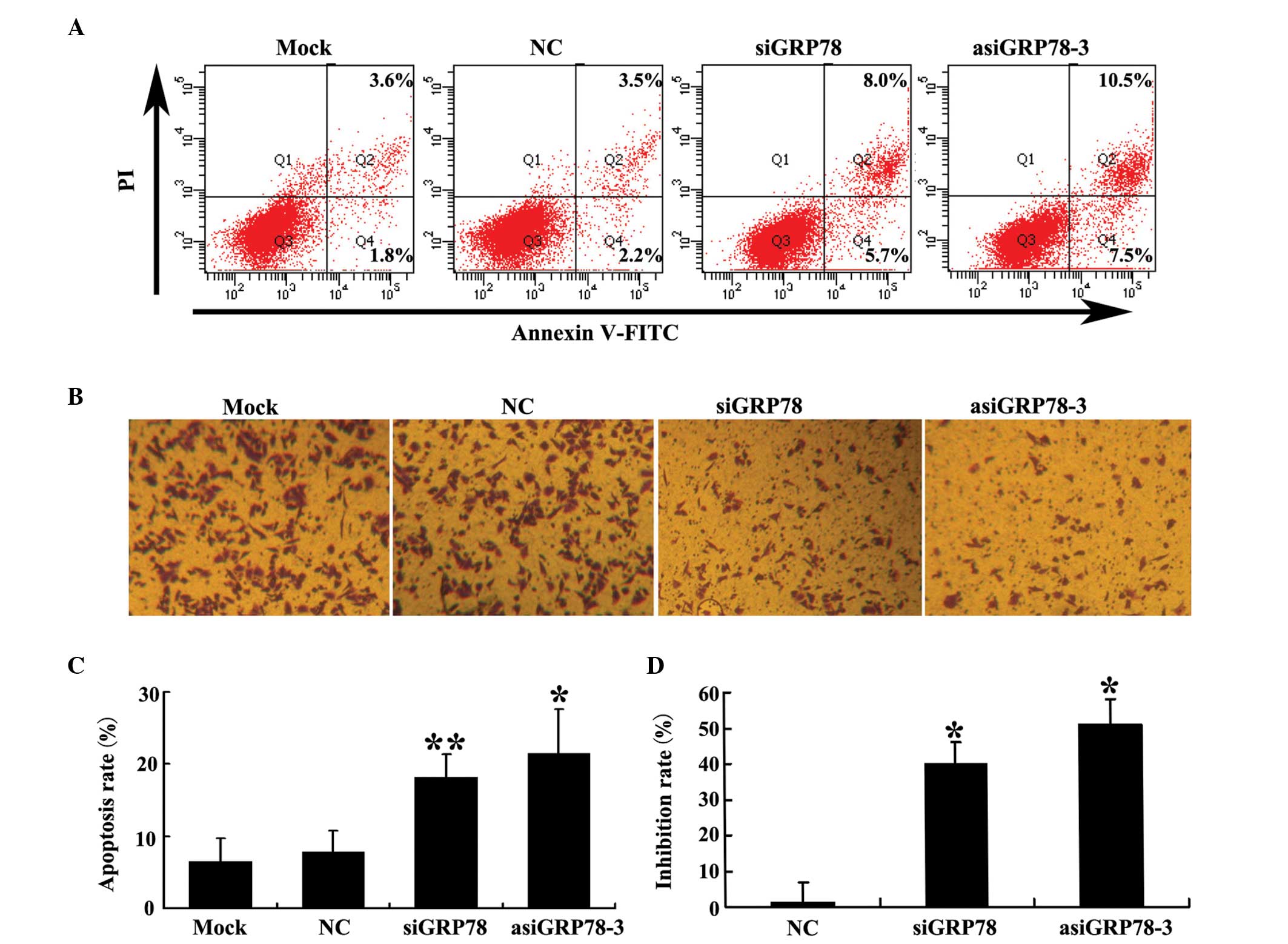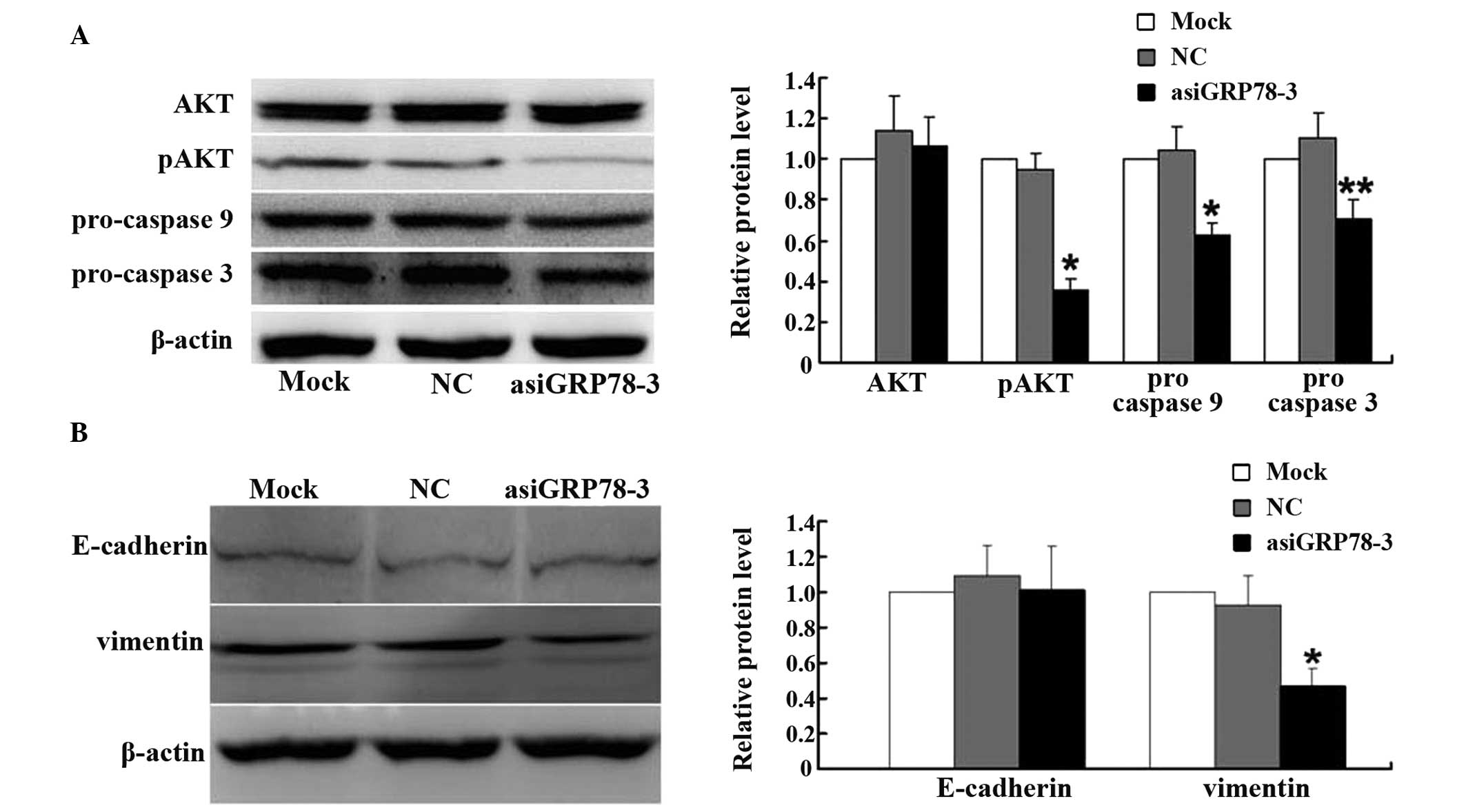|
1
|
Semenas J, Allegrucci C, Boorjian SA,
Mongan NP and Persson JL: Overcoming drug resistance and treating
advanced prostate cancer. Curr Drug Targets. 13:1308–1323. 2012.
View Article : Google Scholar : PubMed/NCBI
|
|
2
|
Feldman BJ and Feldman D: The development
of androgen-independent prostate cancer. Nat Rev Cancer. 1:34–45.
2001. View
Article : Google Scholar : PubMed/NCBI
|
|
3
|
Oh WK and Kantoff PW: Management of
hormone refractory prostate cancer: current standards and future
prospects. J Urol. 160:1220–1229. 1998. View Article : Google Scholar : PubMed/NCBI
|
|
4
|
Misra UK, Mowery Y, Kaczowka S and Pizzo
SV: Ligation of cancer cell surface GRP78 with antibodies directed
against its COOH-terminal domain up-regulates p53 activity and
promotes apoptosis. Mol Cancer Ther. 8:1350–1362. 2009. View Article : Google Scholar : PubMed/NCBI
|
|
5
|
Misra UK, Wang F and Pizzo SV:
Transcription factor TFII-I causes transcriptional upregulation of
GRP78 synthesis in prostate cancer cells. J Cell Biochem.
106:381–389. 2009. View Article : Google Scholar : PubMed/NCBI
|
|
6
|
Huang LW, Lin CY, Lee CC, Liu TZ and Jeng
CJ: Overexpression of GRP78 is associated with malignant
transformation in epithelial ovarian tumors. Appl Immunohistochem
Mol Morphol. 20:381–385. 2012. View Article : Google Scholar : PubMed/NCBI
|
|
7
|
Lee E, Nichols P, Spicer D, Groshen S, Yu
MC and Lee AS: GRP78 as a novel predictor of responsiveness to
chemotherapy in breast cancer. Cancer Res. 66:7849–7853. 2006.
View Article : Google Scholar : PubMed/NCBI
|
|
8
|
Sun Q, Hua J, Wang Q, et al: Expressions
of GRP78 and Bax associate with differentiation, metastasis, and
apoptosis in non-small cell lung cancer. Mol Biol Rep.
39:6753–6761. 2012. View Article : Google Scholar : PubMed/NCBI
|
|
9
|
Li H, Song H, Luo J, Liang J, Zhao S and
Su R: Knockdown of glucose-regulated protein 78 decreases the
invasion, metalloproteinase expression and ECM degradation in
hepatocellular carcinoma cells. J Exp Clin Cancer Res. 31:392012.
View Article : Google Scholar
|
|
10
|
Wang Q, Shu R, He H, et al: Co-silencing
of Birc5 (survivin) and Hspa5 (Grp78) induces apoptosis in hepatoma
cells more efficiently than single gene interference. Int J Oncol.
41:652–660. 2012.PubMed/NCBI
|
|
11
|
Prados J, Melguizo C, Roldan H, et al: RNA
Interference in the treatment of colon cancer. BioDrugs.
27:317–327. 2013. View Article : Google Scholar : PubMed/NCBI
|
|
12
|
Shi H, Deng JH, Wang Z, Cao KY, Zhou L and
Wan H: Knockdown of clusterin inhibits the growth and migration of
renal carcinoma cells and leads to differential gene expression.
Mol Med Rep. 8:35–40. 2013.PubMed/NCBI
|
|
13
|
Zhao Y, Jian W, Gao W, et al: RNAi
silencing of c-Myc inhibits cell migration, invasion, and
proliferation in HepG2 human hepatocellular carcinoma cell line:
c-Myc silencing in hepatocellular carcinoma cell. Cancer Cell Int.
13:232013. View Article : Google Scholar : PubMed/NCBI
|
|
14
|
Zhu Z, Zhu Z, Pang Z, Xing Y, Wan F, Lan D
and Wang H: Short hairpin RNA targeting FOXQ1 inhibits invasion and
metastasis via the reversal of epithelial-mesenchymal transition in
bladder cancer. Int J Oncol. 42:1271–1278. 2013.PubMed/NCBI
|
|
15
|
Clark PR, Pober JS and Kluger MS:
Knockdown of TNFR1 by the sense strand of an ICAM-1 siRNA:
dissection of an off-target effect. Nucleic Acids Res.
36:1081–1097. 2008. View Article : Google Scholar : PubMed/NCBI
|
|
16
|
Jackson AL and Linsley PS: Noise amidst
the silence: off-target effects of siRNAs? Trends Genet.
20:521–524. 2004. View Article : Google Scholar : PubMed/NCBI
|
|
17
|
Chang CI, Yoo JW, Hong SW, et al:
Asymmetric shorter-duplex siRNA structures trigger efficient gene
silencing with reduced nonspecific effects. Mol Ther. 17:725–732.
2009. View Article : Google Scholar : PubMed/NCBI
|
|
18
|
Jo SG, Hong SW, Yoo JW, Lee CH, Kim S and
Lee DK: Selection and optimization of asymmetric siRNA targeting
the human c-MET gene. Mol Cells. 32:543–548. 2011. View Article : Google Scholar : PubMed/NCBI
|
|
19
|
Sun X, Rogoff HA and Li CJ: Asymmetric RNA
duplexes mediate RNA interference in mammalian cells. Nat
Biotechnol. 26:1379–1382. 2008. View
Article : Google Scholar : PubMed/NCBI
|
|
20
|
Daneshmand S, Quek ML, Lin E, et al:
Glucose-regulated protein GRP78 is up-regulated in prostate cancer
and correlates with recurrence and survival. Hum Pathol.
38:1547–1552. 2007. View Article : Google Scholar : PubMed/NCBI
|
|
21
|
Lv L, Xiao XY, Gu ZH, Zeng FQ, Huang LQ
and Jiang GS: Silencing USP22 by asymmetric structure of
interfering RNA inhibits proliferation and induces cell cycle
arrest in bladder cancer cells. Mol Cell Biochem. 346:11–21. 2011.
View Article : Google Scholar : PubMed/NCBI
|
|
22
|
Yin Y, Chen X, Zhang CD, et al: Asymmetric
siRNA targeting the bcl-2 gene inhibits the proliferation of cancer
cells in vitro and in vivo. Int J Oncol. 42:253–260.
2013.PubMed/NCBI
|
|
23
|
Yuan Z, Wu X, Liu C, Xu G and Wu Z:
Asymmetric siRNA: new strategy to improve specificity and reduce
off-target gene expression. Hum Gene Ther. 23:521–532. 2012.
View Article : Google Scholar : PubMed/NCBI
|
|
24
|
Zhang LH and Zhang X: Roles of GRP78 in
physiology and cancer. J Cell Biochem. 110:1299–1305. 2010.
View Article : Google Scholar : PubMed/NCBI
|
|
25
|
Philippova M, Ivanov D, Joshi MB, et al:
Identification of proteins associating with
glycosylphosphatidylinositol-anchored T-cadherin on the surface of
vascular endothelial cells: role for Grp78/BiP in
T-cadherin-dependent cell survival. Mol Cell Biol. 28:4004–4017.
2008. View Article : Google Scholar
|
|
26
|
Shani G, Fischer WH, Justice NJ, Kelber
JA, Vale W and Gray PC: GRP78 and Cripto form a complex at the cell
surface and collaborate to inhibit transforming growth factor beta
signaling and enhance cell growth. Mol Cell Biol. 28:666–677. 2008.
View Article : Google Scholar : PubMed/NCBI
|
|
27
|
Cohen M and Petignat P: Purified
autoantibodies against glucose-regulated protein 78 (GRP78) promote
apoptosis and decrease invasiveness of ovarian cancer cells. Cancer
Lett. 309:104–109. 2011. View Article : Google Scholar
|
|
28
|
Rasche L, Duell J, Morgner C, et al: The
natural human IgM antibody PAT-SM6 induces apoptosis in primary
human multiple myeloma cells by targeting heat shock protein GRP78.
PLoS One. 8:e634142013. View Article : Google Scholar : PubMed/NCBI
|
|
29
|
Suzuki T, Lu J, Zahed M, Kita K and Suzuki
N: Reduction of GRP78 expression with siRNA activates unfolded
protein response leading to apoptosis in HeLa cells. Arch Biochem
Biophys. 468:1–14. 2007. View Article : Google Scholar : PubMed/NCBI
|
|
30
|
Xing X, Li Y, Liu H, Wang L and Sun L:
Glucose regulated protein 78 (GRP78) is overexpressed in colorectal
carcinoma and regulates colorectal carcinoma cell growth and
apoptosis. Acta Histochem. 113:777–782. 2011. View Article : Google Scholar : PubMed/NCBI
|
|
31
|
Chang YJ, Huang YP, Li ZL and Chen CH:
GRP78 knockdown enhances apoptosis via the down-regulation of
oxidative stress and Akt pathway after epirubicin treatment in
colon cancer DLD-1 cells. PLoS One. 7:e351232012. View Article : Google Scholar : PubMed/NCBI
|
|
32
|
Fu Y, Wey S, Wang M, et al: Pten null
prostate tumorigenesis and AKT activation are blocked by targeted
knockout of ER chaperone GRP78/BiP in prostate epithelium. Proc
Natl Acad Sci USA. 105:19444–19449. 2008. View Article : Google Scholar : PubMed/NCBI
|
|
33
|
Zhang LH, Yang XL, Zhang X, Cheng JX and
Zhang W: Association of elevated GRP78 expression with increased
astrocytoma malignancy via Akt and ERK pathways. Brain Res.
1371:23–31. 2011. View Article : Google Scholar : PubMed/NCBI
|
|
34
|
Cardone MH, Roy N, Stennicke HR, et al:
Regulation of cell death protease caspase-9 by phosphorylation.
Science. 282:1318–1321. 1998. View Article : Google Scholar : PubMed/NCBI
|
|
35
|
Li P, Nijhawan D, Budihardjo I, et al:
Cytochrome c and dATP-dependent formation of Apaf-1/caspase-9
complex initiates an apoptotic protease cascade. Cell. 91:479–489.
1997. View Article : Google Scholar : PubMed/NCBI
|
|
36
|
Chiu CC, Lin CY, Lee LY, et al:
Glucose-regulated protein 78 regulates multiple malignant
phenotypes in head and neck cancer and may serve as a molecular
target of therapeutic intervention. Mol Cancer Ther. 7:2788–2797.
2008. View Article : Google Scholar : PubMed/NCBI
|
|
37
|
McInroy L and Määttä A: Down-regulation of
vimentin expression inhibits carcinoma cell migration and adhesion.
Biochem Biophys Res Commun. 360:109–114. 2007. View Article : Google Scholar : PubMed/NCBI
|















